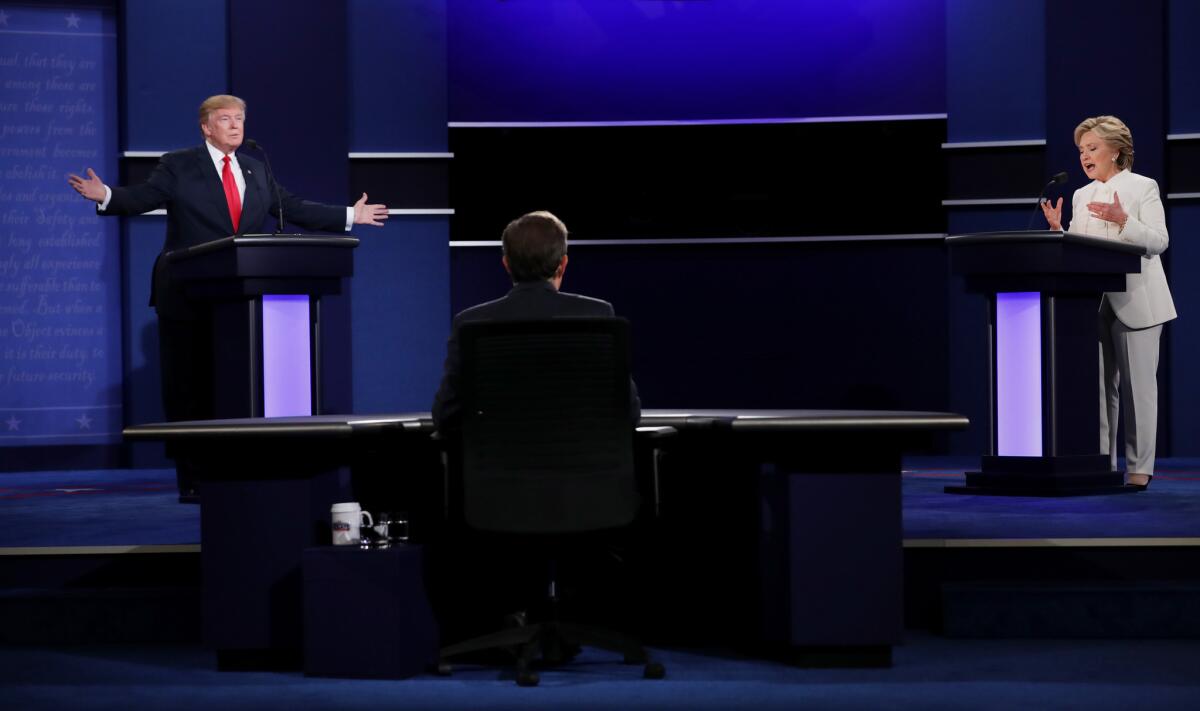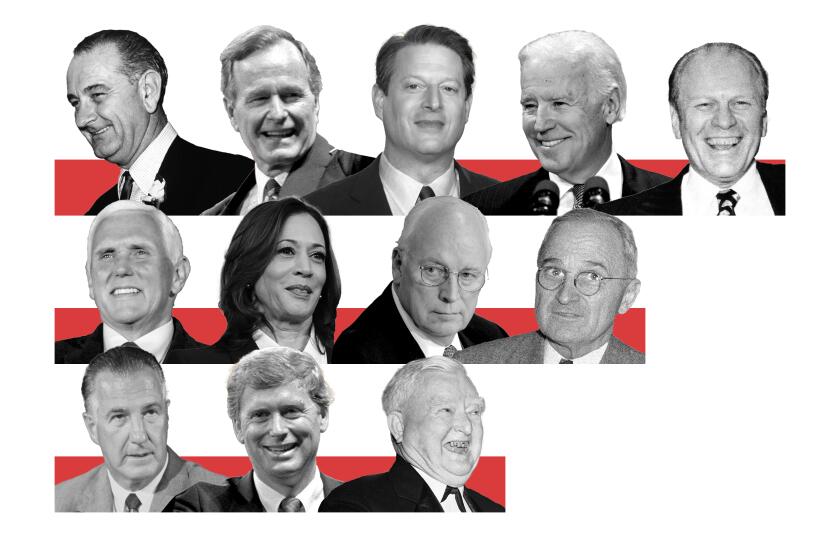Opinion: Trump’s cynicism about election results is far different from Bush-Gore fight

Surrogates for Donald J. Trump have been trying to compare one of the more reprehensible moments of Wednesday’s debate — Trump’s refusal to say that he would accept the election results — to Al Gore’s reaction to the 2000 presidential vote count in Florida. But it’s not an apt comparison for a couple of reasons.
First, the initial 2000 count in Florida was remarkably close, and Gore, after initially conceding to George W. Bush, withdrew his concession and sought a recount in four counties, which evolved into a legal fight that went all the way to the Supreme Court (the timeline is here). But once the Supreme Court issued its controversial ruling to halt the recount, Gore accepted it and conceded.
There’s a big difference between seeking to make sure ballots are properly counted, including a recount where advisable, and refusing to accept the results once they are. Gore contested the count, and then accepted the result when it didn’t go his way, and pledged his support to George W. Bush. It’s a red herring to say, well, Gore supporters didn’t accept it. Many of them didn’t, but they weren’t the ones running for president. Key here is the losing candidate accepted the result.
Debate moderator and “Fox News Sunday” anchor Chris Wallace didn’t ask Trump whether he would contest close vote counts, which is entirely within a candidate’s right to do. Wallace asked whether Trump would accept the results, and Trump refused to say that he would, instead opting for a bizarrely coy answer.
This was the exchange:
CHRIS WALLACE: Your running mate, Gov. Pence, pledged on Sunday that he and you — his words — “will absolutely accept the result of this election.” Today your daughter, Ivanka, said the same thing. I want to ask you here on the stage tonight: Do you make the same commitment that you will absolutely — sir, that you will absolutely accept the result of this election?
TRUMP: I will look at it at the time. I’m not looking at anything now. I’ll look at it at the time.
Then, after Trump digressed into a litany of perceived conspiracies arrayed against him, came this exchange:
WALLACE: But, sir, there is a tradition in this country — in fact, one of the prides of this country — is the peaceful transition of power and that no matter how hard-fought a campaign is, that at the end of the campaign that the loser concedes to the winner. Not saying that you’re necessarily going to be the loser or the winner, but that the loser concedes to the winner and that the country comes together in part for the good of the country. Are you saying you’re not prepared now to commit to that principle?
TRUMP: What I’m saying is that I will tell you at the time. I’ll keep you in suspense. OK?
No, that’s not OK.
Trump has spent the entire campaign throwing rocks at mainstream politics and the mainstream media, which, truth to say, is also an American tradition. But of late he has repeatedly charged that the electoral system itself is rigged, and warned supporters that the forces arrayed against him may wrest the election away through subterfuge.
Like most everything else that comes out of Trump’s mouth, that is manifestly untrue, and stealing an election is extremely unlikely, bordering on the impossible, given the decentralized way the U.S. conducts elections, from scattered polling places and, in most states, county-by-county management with poll watchers from both major parties. To imagine an election stolen under those circumstances is to embrace a conspiracy of immense dimensions, and is foolish. But reality isn’t necessarily persuasive for the 41% of Americans who believe such a feat is possible.
There are many reasons why Trump is unsuited to serve as president, from his willful incomprehension of how government works, to his persistent and offensive statements about women and minorities (both ethnic and religious), to his abject ignorance of the intricacies of foreign policy, to his preternatural inability to tell the truth.
But after Wednesday’s debate, the biggest argument against him has crystallized: His sinister and self-serving willingness to undermine the legitimacy of American democracy itself.
Someone with such a base disregard for a nation and its core institutions has no business serving as its president.
Follow my posts and re-tweets at @smartelle on Twitter
More to Read
A cure for the common opinion
Get thought-provoking perspectives with our weekly newsletter.
You may occasionally receive promotional content from the Los Angeles Times.











